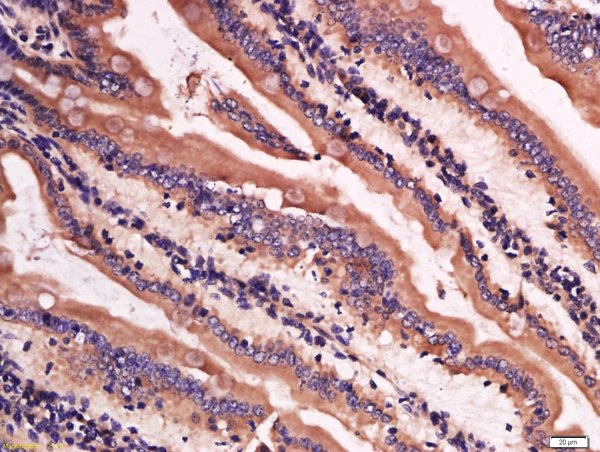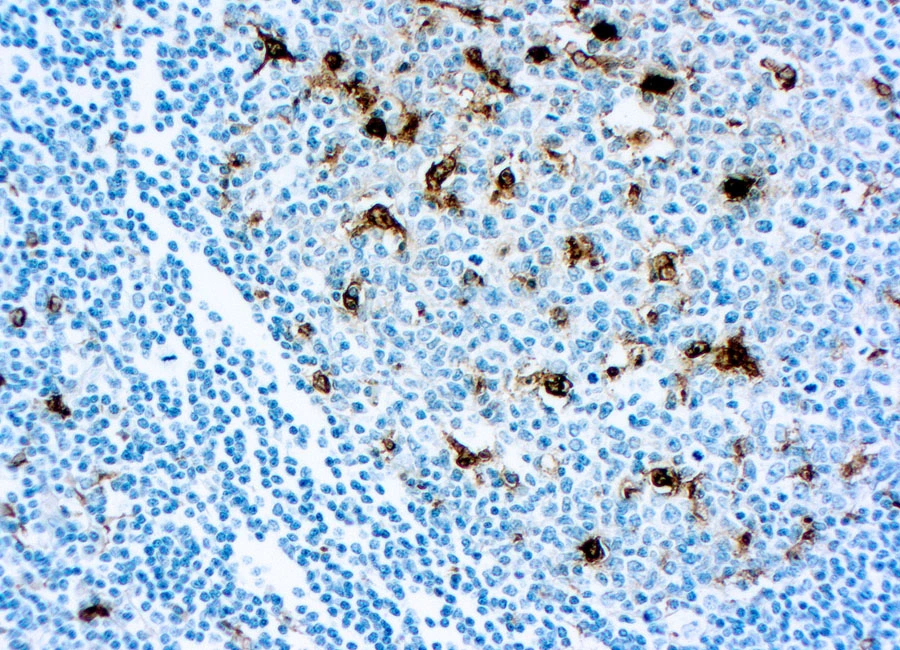![IHC-P analysis of human lung cancer section using GTX03202 Lysozyme antibody [GT1290]. Blue : DAPI for nuclear staining Dilution : 1:100 IHC-P analysis of human lung cancer section using GTX03202 Lysozyme antibody [GT1290]. Blue : DAPI for nuclear staining Dilution : 1:100](https://www.genetex.com/upload/website/prouct_img/normal/GTX03202/GTX03202_20210615_IHC-P_2_w_23053123_892.webp)
IHC-P analysis of human lung cancer section using GTX03202 Lysozyme antibody [GT1290]. Blue : DAPI for nuclear staining Dilution : 1:100
Lysozyme antibody [GT1290]
GTX03202
ApplicationsWestern Blot, ImmunoHistoChemistry, ImmunoHistoChemistry Paraffin
Product group Antibodies
ReactivityHuman, Mouse
TargetLYZ
Overview
- SupplierGeneTex
- Product NameLysozyme antibody [GT1290]
- Delivery Days Customer9
- Application Supplier NoteWB: 1:500 - 1:2000. *Optimal dilutions/concentrations should be determined by the researcher.Not tested in other applications.
- ApplicationsWestern Blot, ImmunoHistoChemistry, ImmunoHistoChemistry Paraffin
- CertificationResearch Use Only
- ClonalityMonoclonal
- Clone IDGT1290
- Concentration0.65 mg/ml
- ConjugateUnconjugated
- Gene ID4069
- Target nameLYZ
- Target descriptionlysozyme
- Target synonymsAMYLD5, LYZF1, LZM, lysozyme C, 1,4-beta-N-acetylmuramidase C, c-type lysozyme, lysozyme F1
- HostRabbit
- IsotypeIgG
- Protein IDP61626
- Protein NameLysozyme C
- Scientific DescriptionThis gene encodes human lysozyme, whose natural substrate is the bacterial cell wall peptidoglycan (cleaving the beta[1-4]glycosidic linkages between N-acetylmuramic acid and N-acetylglucosamine). Lysozyme is one of the antimicrobial agents found in human milk, and is also present in spleen, lung, kidney, white blood cells, plasma, saliva, and tears. The protein has antibacterial activity against a number of bacterial species. Missense mutations in this gene have been identified in heritable renal amyloidosis. [provided by RefSeq, Oct 2014]
- ReactivityHuman, Mouse
- Storage Instruction-20°C or -80°C,2°C to 8°C
- UNSPSC12352203

![WB analysis of various samples using GTX03202 Lysozyme antibody [GT1290]. Dilution : 1:1000 Loading : 25microg per lane WB analysis of various samples using GTX03202 Lysozyme antibody [GT1290]. Dilution : 1:1000 Loading : 25microg per lane](https://www.genetex.com/upload/website/prouct_img/normal/GTX03202/GTX03202_3_WB_w_23053123_165.webp)
![Various whole cell extracts (30 microg) were separated by 15% SDS-PAGE, and the membrane was blotted with Lysozyme antibody [GT1290] (GTX03202) diluted at 1:1000. The HRP-conjugated anti-rabbit IgG antibody (GTX213110-01) was used to detect the primary antibody. Various whole cell extracts (30 microg) were separated by 15% SDS-PAGE, and the membrane was blotted with Lysozyme antibody [GT1290] (GTX03202) diluted at 1:1000. The HRP-conjugated anti-rabbit IgG antibody (GTX213110-01) was used to detect the primary antibody.](https://www.genetex.com/upload/website/prouct_img/normal/GTX03202/GTX03202_4000000276_20210625_WB_w_23053123_342.webp)



